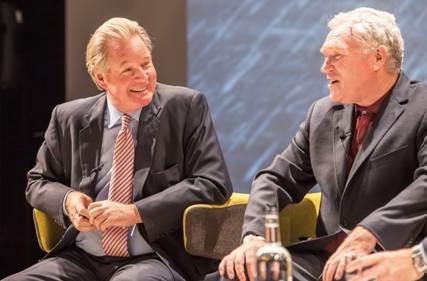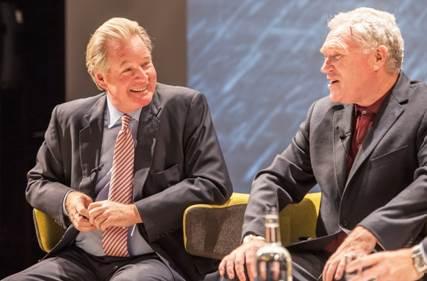St George's Park Chairman Confident England Will Reach World Cup or Euros Final in 2020s
St George's Park chairman David Sheepshanks believes England's men's senior team will become increasingly successful and realistically will reach a World Cup or European Championships final during the 2020s, as a result of the FA's long-term commitment to coaching excellence.
Speaking at Salford Business School's 'Beautiful Game: Ugly Business' football business expert panel debate at the University of Salford's MediaCityUK campus last night (Tuesday 9 September), the FA's National Football Centre head also claimed that in the last 25 years too many English players had been “rewarded for mediocrity”, but that this culture was already changing.
Highlighting the crucial importance of 'teachers' in the national game, Sheepshanks said: “I believe so strongly in our commitment to coaching excellence at all age levels in the men's and women's game. If you really believe in what you're doing, you have to focus on a long-term result, and personally I'm convinced that our work at St George's Park, collaborating with the Premier League and other stakeholders, will mean that England can realistically reach a World Cup final or European Championships final during the 2020s.
“It's not about being successful once and once only. The England team needs to challenge year in, year out, and I'm determined that we'll create the right environment for England football fans to have an expectation of seeing consistently successful England national teams within the next ten to 15 years.”
Sheepshanks continued: “The French founded Clairefontaine in 1988 and won the World Cup in 1998. Spain established the Cuidad del Fútbol in 2003 and enjoyed fantastic success in winning two European Championships and a World Cup. And at the Brazil World Cup we saw the result of the DFB's decision to rethink their entire approach to German national football after a disastrous Euro 2000.
“At long last the FA now has its own National Football Centre at St George's Park and we're committed to instilling a culture of continuous improvement, leadership and reappraisal in our English coaches, constantly benchmarking us against the best, and making this part of the DNA of the English game.”
Sheepshanks suggested that complacency and acceptance of mediocrity had critically damaged English football over the last 25 years. “There are of course so many honourable exceptions, the Gerrards and the Lampards and many more, but equally too many English players have been rewarded for mediocrity in the past,” he said.
“That doesn't help you build the right culture for success, but this attitude has changed and is changing as we speak. Only 32% of Premier League footballers are qualified to play for England – that's around 60 players regularly appearing in first teams.
“We need to boost this to 90, 100 and more, and I strongly believe that we will, through training the coaches of tomorrow to the very highest standard – inspirational coaches who encourage the necessary commitment and dedication for many more young English players to make it all the way to the top.”
Beyond continuous professional development, Sheepshanks also feels that English football can learn much more from business and other stakeholders. “Succession planning is critically important in maintaining success in football at any level and, after periods of sustained success, it's something that taxes even the best sports and business leaders.
“People asked questions of how Spain had a squad in Brazil with such a high average age and perhaps, in hindsight, I'm sure one of the things that they may conclude is that they didn't change things quickly enough.”
Sheepshanks joined Dan Jones, Head of the Sports Business Group at Deloitte, and Professor Chris Brady, Director of the Centre for Sports Business at Salford Business School, as the expert panel for the Beautiful Game: Ugly Business event, which was chaired by the Inspired Leadership Network's CEO René Carayol.
The evening's lively debate also incorporated a Q&A with the audience of sports business professionals, students, alumni and academics. Topics included the financial state of Football League clubs; the importance of FA investment in grassroots football and youth coaching; the possibility of American Football's 'Rooney Rule' (which requires NFL teams to interview at least one ethnic minority candidate for head coach and senior management vacancies) being introduced in English football; and the health of the international game.
Professor Amanda Broderick, Salford Business School Dean, said: “The focus on values, attitude, performance science and leadership is critical to realising the FA's objective to build all 24 national teams to global pre-eminence.
“The partnership between Salford Business School and the Class of '92, together with our wider Centre for Sports Business work, aim to be a major contributor to this.”
-Ends-
Photo captions:
1. David Sheepshanks speaking at Salford Business School's Beautiful Game: Ugly Business event.
2. David Sheepshanks (left) and Professor Chris Brady, panellists at Salford Business School's Beautiful Game: Ugly Business event.
High resolution versions of these images, and a selection of other images from the event, can be downloaded from the University of Salford's Flickr photostream athttps://www.flickr.com/photos/salforduniversity/sets/72157647033207810/.
Notes to editors:
- Follow Salford Business School's Twitter account @salfordbizsch for the latest updates on news and events.
For further information contact:
Ben Cawley
Press and PR Officer
The University of Salford
Tel: +44 (0)161 295 4779
Email: b.cawley@salford.ac.uk
Press release distributed by Pressat on behalf of University of Salford, on Wednesday 10 September, 2014. For more information subscribe and follow https://pressat.co.uk/
Salford Manchester Business & Finance
You just read:
St George's Park Chairman Confident England Will Reach World Cup or Euros Final in 2020s
News from this source:




